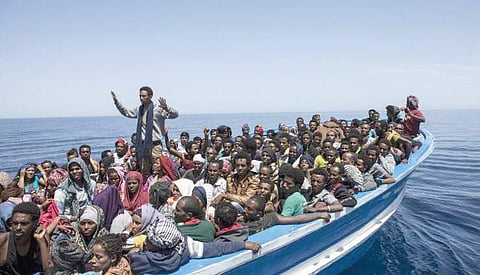

Among other major challenges that the world faces today, the refugee and irregular migration crises seem to be the most prevalent and, indeed, the ones with the greatest human toll. It is above all a global challenge of epic dimensions. It concerns us all, since no single state can face them alone. Either we manage them collectively, comprehensively and on the basis of our values, or we fail.
The global crises of refugee influx and illegal migration are, lately, mostly evident in Europe and, more particularly, in the Mediterranean Sea. Europe is shaken by the biggest migratory pressures since World War II and the effects of poverty, suppression and war in its immediate neighbourhood.
While European States and the European Union work to preserve social cohesion and security for their citizens, the global dimensions of these ongoing crises call for increased awareness and safeguards as to the international rights of real people, who are the victims of this tragedy.
At the same time, the important distinction between refugees and irregular migrants is of paramount importance, as the latter form a special category, which needs to be addressed in conjunction with the former, but within a different legal and political context.
Masses of people flee their homelands worldwide. The reasons for these unprecedented population movements vary, but at their core lie a common denominator: man. An anthropocentric approach is therefore called for, both at the crisis response and the political levels.
It is our obligation as governments to tackle these issues with humane policies, abiding by our value system and international law; it is also our political duty not to let the irregular migration and refugee crises impact on the political discourse, giving rise to xenophobia, radicalisation and nationalism. To this end, the UN and USA Summits of September 19 and 20 were important milestones.
From Greece’s perspective, both our country and people, already confronted with a deep economic crisis, have been facing this global challenge that surpasses any country’s capacities.
And we have been doing this by demonstrating solidarity and compassion for those people in need, a trait deeply rooted in the Greek tradition, history and values. In less than a year and a half, we have witnessed an influx of over 1,2 million migrants.
Nearly 60,000 of them have remained stranded in Greece, after our northern borders were shut off through unilateral steps. While building on national and European capacities to deal with asylum seekers, Greece and the European Union try to tackle the underlying reasons of the problems: economic, political and other. We have strengthened existing European mechanisms and prepared new policies and financial instruments to address the root causes of illegal migration and refugee influxes from African and other countries; we have created national institutions, even a new ministry dealing with the refugee and migration crises; we work together with UN and international organisations; we have an important EU-Turkey cooperation agreement. We also try to improve the existing EU policy for asylum and illegal migration.
In these turbulent times, the global crises of illegal migration and refugee movements need political realism, a hands-on approach, collective action and synergies from all international and national actors. We believe that a problem of this magnitude that concerns real people and has already cost thousands of lives in the Mediterranean and elsewhere has to be the object of the international community’s concerted efforts.
Against this background we think that India and Greece can play an important role in addressing this challenge by promoting responsibility sharing and refute the xenophobic migration agenda by increasing support to countries hosting refugees, promote returns and resettlement, as well as tackle the root causes of the crises and combat trafficking networks and smuggling.